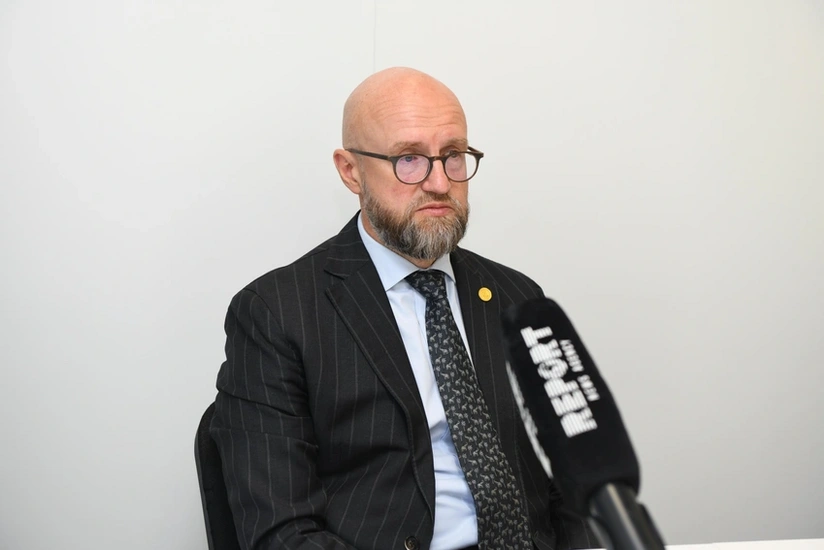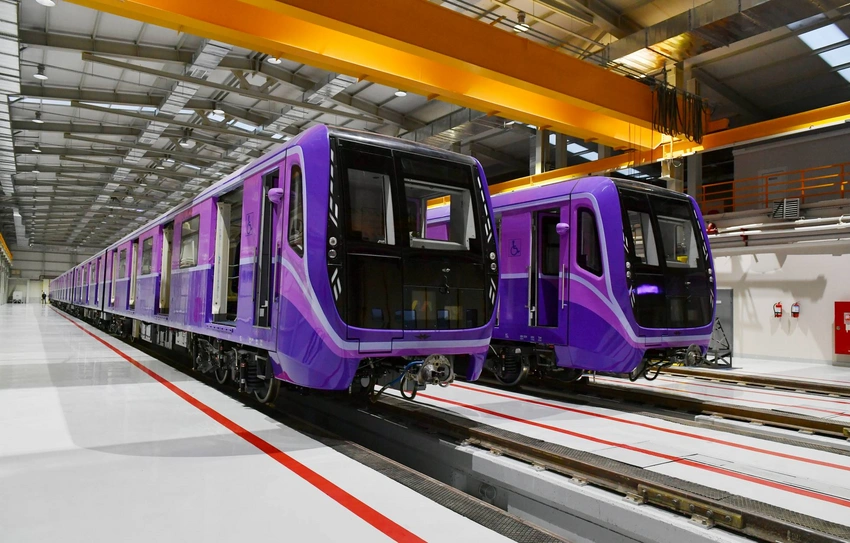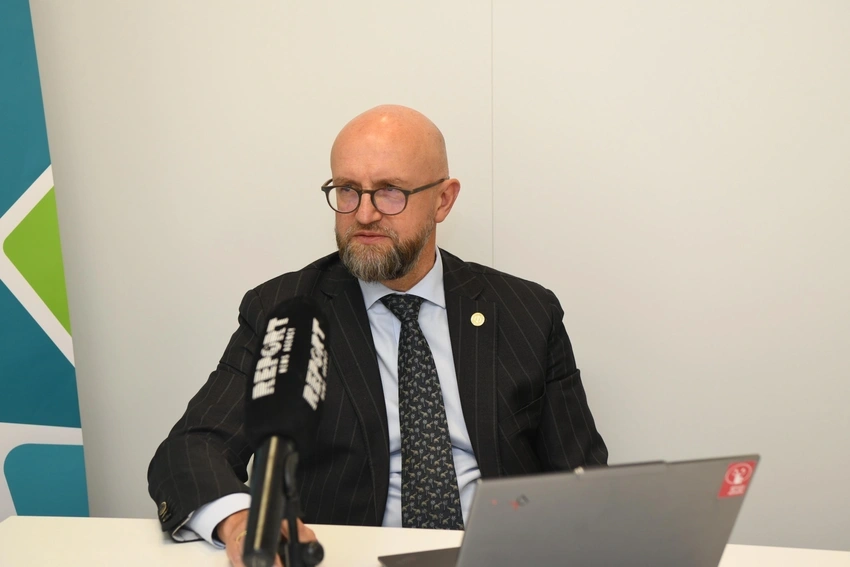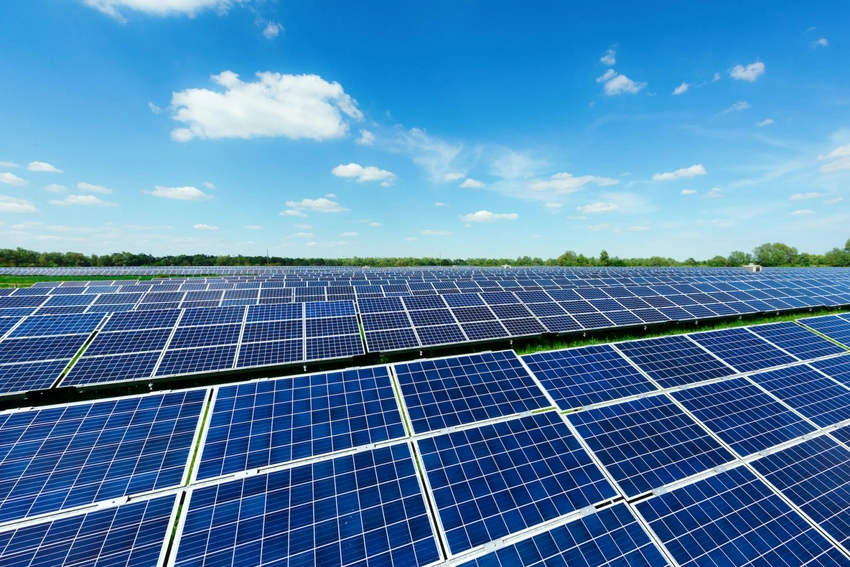Konstantin Limitovsky: AIIB сonsidering new investments in Azerbaijan's renewable energy – INTERVIEW
- 01 October, 2025
- 16:32

Azerbaijan's cooperation with the Asian Infrastructure Investment Bank (AIIB) is reaching a new level. While the focus was previously on individual infrastructure projects, today it is a long-term investment program encompassing energy, transport, and sustainable development. For a country seeking to strengthen its strategic position in the region, this partnership opens new horizons.
In an interview with Report, Konstantin Limitovsky, AIIB Chief Investment Officer, Public Sector (Region 2) & Project and Corporate Finance (Global) Clients, discussed how the bank is building a multi-year cooperation program with Azerbaijan and the projects that will form its core.
Report presents the interview:
- AIIB is developing a long-term investment program for Azerbaijan, structured around three key priorities. Could you please clarify the timeframe for this program and the volume of financing envisaged?
- AIIB is developing a multiyear investment program under the Joint Declaration on Strategic Cooperation, signed in September 2025. The Joint Declaration aligns with Azerbaijan's national vision, as outlined in its "2030 National Priorities for Socio-Economic Development," and AIIB"s core mission of financing "Infrastructure for Tomorrow." The enhanced cooperation aims to establish a dynamic, multi-year investment program for AIIB sovereign-backed financing.
- Is AIIB considering participation in the expansion of the Southern Gas Corridor? If yes, in what format – direct investments, loans, syndicated financing?
- AIIB recognizes the transitional role of natural gas in supporting Members" energy and climate objectives, particularly by reducing reliance on coal and oil, enabling renewable energy integration, and strengthening energy security. At the same time, the Bank"s engagement is guided strictly by its Corporate Strategy, Environmental and Social Framework and Energy Sector Strategy, which define natural gas as eligible only for transitional investments. Additionally, AIIB has committed that all its financings will align with the Paris Agreement. This means AIIB may consider financing midstream infrastructure (such as LNG terminals, storage facilities, and pipelines), gas-fired power generation, and downstream distribution projects, provided they meet clear criteria which include amongst others: alignment with national climate policies and decarbonization trajectories; avoidance of carbon lock-in; reduction of sector carbon intensity over time; use of best available technologies to limit methane emissions; and no displacement of more sustainable low-carbon alternatives. Any potential support for projects connected to the Southern Gas Corridor would be assessed against these conditions and subject to detailed due diligence and approval by AIIB's governance bodies.

- According to the State Program for the Development of Transport Infrastructure in Baku and Adjacent Territories for 2025 – 2030, part of the initiatives are expected to be financed through an AIIB loan. What are the indicative scale and terms of this financing? Which metro lines or sections are expected to be prioritized?
- AIIB is working hand-in-hand with Baku Metro and the Azerbaijani authorities with one common goal of bringing the State Program for Improving Transport Infrastructure to life. This is not just about building tracks; we fully support the government's efforts to provide a safe and accessible means of transport to the present and future generation of Baku residents. The collaboration envisions up to USD 1 billion in sovereign-backed financing, with the first phase focusing on unlocking the full potential of the Green Line. We began by targeting the extension and completion of the Darnagul and Khojasan Depots, which will enable the metro system to expand its capacity and serve more people more reliably. We will also targeting investing in cleaner air, safer stations, and more accessible platforms because every journey should provide an inclusive and quality experience for each commuter. Phase I is also considering the upgrade of multiple stations along the Green Line, making them more welcoming and resilient. Phase II is where the horizon of our support expands. The Green Line will stretch from Khatai to Hazi Aslanov, connecting communities, reducing congestion, and supporting Baku's transformation into a model of sustainable urban development. This is about mobility, yes, but it's also about providing opportunities to the younger generations.
- The Asian Development Bank (ADB) has announced a tender to select a consultant for preparing the Feasibility study for the first stage of the "Central Asia – Azerbaijan Green Energy Trans-Caspian Corridor" Project, after which AIIB is expected to conclude direct contracts. At what stage is this process now? Have agreements already been signed and when is the project implementation expected to begin?
- AIIB, together with ADB and the Governments of Azerbaijan, Kazakhstan and Uzbekistan is actively advancing the feasibility preparation for the Caspian Green Energy Corridor. In April 2025, Ministries of Energy of the three countries signed a Memorandum of Understanding (MoU) with ADB and AIIB to jointly support the first stage of project preparation.

Already, the Multilateral Cooperation Center for Development Finance (MCDF) has approved a USD 1 million grant to support upstream preparation.
- AIIB has previously expressed readiness to support the development of the Middle Corridor, including financing for rail and road infrastructure, ports, logistics centers. Which specific projects are currently being discussed as priorities?
- The Bank remains strongly committed to supporting the Middle Corridor, given its potential to enhance Eurasian connectivity. Now, AIIB is helping redefine Kazakhstan's transport DNA through climate-resilient smart highways that fuse durability with digital innovation In Türkiye, it is advancing the country's rail renaissance with cutting-edge projects like the Eastern Türkiye Middle Corridor Railway, which are significantly reducing transit times between Asia and Europe. In cooperation with the Azerbaijani authorities and ADB, AIIB is assessing opportunities to strengthen rail and road infrastructure, logistics hubs, and port facilities along this route. While individual projects are still under preparation, discussions focus on investments that would increase freight capacity, reduce bottlenecks at border crossings, and improve multimodal transport integration. Priority is being given to infrastructure that can expand Azerbaijan's role as a transit hub and improve reliability of east–west trade flows.
- Does AIIB plan to participate in the financing of the expansion and modernization of the Baku International Sea Port?
- The Port of Baku is a central hub for regional trade and logistics, and its expansion under Phase II is designed to increase the port's throughput capacity from 15 million tons to 25 million tons per year, and from 100,000 TEU to 500,000 TEU per year. AIIB is making joint efforts with the World Bank Group to enhance the capacity, efficiency, and resilience of the Port of Baku.

- At COP 29, AIIB signed agreements to finance solar projects – Banka and Bilasuvar 760 MW Solar PV Power Project. It was also mentioned earlier that new solar and wind energy projects are being prepared. Could you please provide more details on these projects and indicate current stage of negotiations?
- At COP29, AIIB signed agreements to finance two large-scale solar plants in Azerbaijan – a 315 MW Banka and a 445 MW Bilasuvar solar PV plants located in Neftchala and Bilasuvar Districts, respectively. Together, they will add 760 MW of clean generation capacity, making them among the largest renewable energy projects in the country. The total investment is around USD 670 million. These projects are being developed jointly with Masdar, SOCAR Green, ADB and EBRD.
Both plants are designed in line with international environmental and social standards, Environmental and Social Impact Assessments, biodiversity surveys, and livelihood restoration plans have been completed. Early construction has started at Bilasuvar, with commissioning of both projects expected by 2027.
Beyond these two projects, AIIB is in discussions with partners about additional solar and wind energy initiatives in Azerbaijan. While details are still under preparation, the focus will remain on scaling renewable capacity and integrating it into the grid in a way that supports reliability and resilience. In parallel, AIIB has joined regional governments and other development banks in preparing the Caspian Green Energy Corridor, which will create the infrastructure needed to transmit renewable electricity across borders.
